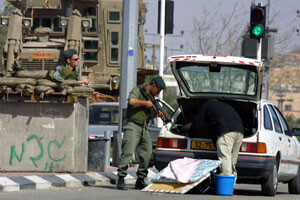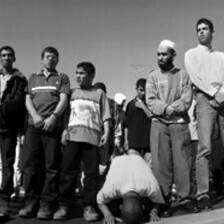Bethlehem 30 November 2002

Above: The Bethehem-Jerusalem checkpoint in March 2002. The continual closure of Jerusalem since March 1993 to all but a handful of the 3 million Palestinians in the West Bank and Gaza is a huge source of tension and conflict. Since Israel’s reoccupation of Palestinian towns has become a regular occurance since March 2002, the Palestinian population have had to deal with an additional burden of seemingly endless curfews accompanied by house-to-house searches. Photo by Musa Al-Shaer.
The real lifting of the curfew, as well as the shopping hours, are usually announced at only the last moment, and only then people start planning. After Wednesday night opening hours were announced for Thursday afternoon. Immediately the head of the local branch of the Ministry of Education called all school students to go to school during those opening hours. Next day morning, in a routine play with people’s nerves, the army called off what they earlier had announced to be the opening hours, apparently because they did not want to have young people gathering at schools. Then at one o’clock the same opening hours were announced once again but of course too late for organizing the school lessons. Psychological warfare.
Anyway, tells Fuad, many parents do not want to have their children going to school under these circumstances. He too wants to continue the institute’s work as much as possible during the limited time available by doing remedial teaching for students and visiting the families who have been hard hit, including those whose house has been demolished, or a son arrested. Father Louis, too, is making such visits in the community.
The economy is going from bad to worse. Shopkeepers see that they might be unable to sell their Eid al-Fitr and Christmas wares. One shopkeeper tells Mary that she should not be afraid for a curfew during Christmas. For sure the feast will be celebrated, and therefore she should see and buy his decorations. But Mary observes that shopkeepers increasingly play with the prices. The number of robberies increases as well.
The shop for mobile telephones of Fuad’s son in law was robbed for over 10,000 dollars during the first day of the curfew when people were yet unprepared to arrange their shops while rushing home. Elias sometimes tresspasses the curfew to check whether nothing happened to the computers at the institute. His son, who studies in the northern West Bank, has run out of money and Elias looks for special ways to bring him money since the banks are closed.
Obviously, the political situation, the fact that youth don’t have much to do and are closed up (imagine the many big families who can’t leave their small rooms), the poverty, and a host of other factors add to the enormous pressure which presently falls upon the community relations. While walking up into the main Madbasseh street, Mary saw a toshe (quarrel) at a falafel place; about nothing she later heard, but the atmosphere and people’s faces were so threatening that she decided not to do shopping and return home. The tension is also palpable in the refugee camps which are crowded and bear a large share of the arrests. Opposite my house I observe, through the window of the room where I am working on the computer, the youth of ‘Azza camp throwing stones at passing tanks from the top of their crowded apartment buildings. The tanks or jeeps sometimes stop, soldiers come out to shoot in the air, then go back in their vehicles, and continue their way. Afterwards the youth come out again.
Day in day out doing nothing else than throwing stones at one another or at tanks must no doubt affect them psychologically. At one point a group of youngsters entered our courtyard and somebody threw the plants from our veranda on the ground. I heard one boy shouting adjnabi (foreigner) while another, as I could see while peeping out of the window, imitated shooting a machine gun. I phoned Mary who came and immediately went into the camp to speak with the sheikh who often helps her carrying her shopping bags home. On her way the kids threw pebbles at her (Jara later commented: “Why didn’t they throw them at the Israelis?”) They called her masikhiyeh, (“Christian”). Mary told them that we had respected each other for two years and that we wanted to continue to keep the relationship like that.
Later, when I myself received some pebbles while walking to my family in law, I approached the kids and started talking with them. Yes, they wouldn’t do it again. Hundred meters down they put on small fires and even took old stones out of the street walls to create obstacles for the passing army jeeps. Also windows at the end of the street were broken; the distinction between resistance and vandalism barely existent. It is obvious that with each new long curfew such behaviour will increase. I wonder whether it is the army’s aim to head for a community breakdown, which is not unthinkable.
I decide to make plans to have more contacts with the camp and see whether we can involve them in one of the institute’s projects. When I tell this to a friend, he says “Typical you, thinking that projects solve anything.”
* * *
I am glad to hear the neighbouring cock crying. During long moments of the day a complete and unnatural silence reigns. The muezzin echoes sound louder than normal. As always during curfews you have to discipline yourself in a daily rhythm because otherwise you loose your idea of time, the hour, the day. Mary sometimes tresspasses the curfew to get out or to have the feeling of getting out. She is only afraid for tanks, not for military jeeps, she says.
Two days ago she happened to walk along a tank at the university hill which stopped an ambulance car. Fortunately the soldiers let Mary, her mother and Jara pass by undisturbed. In such circumstances Mary always immediately tells Jara that she shouldn’t be afraid. She was “a little” afraid, Jara said afterwards but it otherwise didn’t seem to bother her. Tamer also wants to go out, he moves or removes everything nearby when seeing the sun rays through the door window. Mary walks with him in the garden. His laugh sounds like “gh…gh”, as Ernie’s in Sesame Street, a laugh which is very dear to us.
* * *
At our family in law we decorate the Christmas tree, to the great excitement of both Tamer and Jara. Jara wants to hear at least three long fairy tales a day and preferably act them out as well, she the princess and I all the other roles. During the first five days of the curfew, just before going asleep, and after many treasure hunts, dangers and weddings, she was used to ask Mary “Bukra fi madrase?” (Is there school tomorrow?), breaking my heart each time. Then she resigned, stopped asking, which gas been even more painful.
Staying the night at my mother’s in law I hear the peaceful, regular sighs of Tamer, Jara and Mary around me, and also the soft winter rain outside. I stare at the ceiling. When, and what, will be the end of all this?
Toine van Teeffelen, a Dutch national married to a Palestinian, is project manager at the Arab Educational Institute, and the local coordinator of the United Civilians for Peace, a Dutch initiative to send civilian monitors to the West Bank and Gaza Strip.



